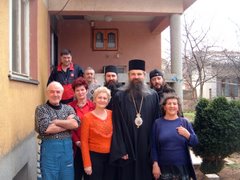Unfinished Business In Kosovo
Unfinished Business in the Balkans
Aug 12, 2009
By D. HUNTER HAYNES | For the past several years, the unresolved issues in Bosnia-Herzegovina and Kosovo have, in large part, been delegated to Europe, while the US busied itself with more pressing matters in Afghanistan and Iraq. That is about to change and the American people should be very concerned.
During his recent trip to Bosnia and Serbia, Vice-President Biden made it clear that the Obama administration is about to reclaim the leading role in the implementation of the Balkan’s European assimilation. The new guard in Washington is not pleased with the failure of Balkan integration into the Western political scene, so—once again—the US is about to delve into the inter-ethnic complexities of the Powder Keg of Europe.
U.S. Vice President Joe Biden, left, hands with Serbia's President Boris Tadic, in Belgrade, Serbia, Wednesday, May 20, 2009.
According to Mr. Biden, the greatest obstacle to a secure and prosperous future in Bosnia and Kosovo appears to be the nationalistic tendencies of certain people. For some strange reason, they will not “forget the past and embrace the future.” Joe Biden has no tolerance for independent-minded holdouts—who he derisively labels “nationalists.”
According to the plan of liberals and neocons alike, those who refuse to consign themselves to the relativistic, multiculturalism of the West must be identified, marginalized, and eventually removed from the political process altogether. Simply stated, there is no room for patriotism, ethnic identity, culture, and traditional Christianity in today’s US-EU fraternity. Unfortunately for Washington and Brussels, not everyone in Bosnia, Serbia, and Kosovo has resigned himself to abject humanism and the betrayal of God and country.
Mr. Biden believes that Kosovo independence is irreversible and critically important to the region’s stability and progress. He is wrong on all counts. Kosovo independence is fully reversible and until that happens there will be no lasting stability or progress anywhere in the Balkans. The familiar saying, “It all began in Kosovo and it will end in Kosovo,” still holds true. By no means is the new, pseudo-state of Kosovo an end—it is only a temporary and unfortunate distraction on the path towards a lasting and just solution.
Kosovo is a land where local myth negates the historical facts and strategic plans of Western scholars and policy makers, and forms a higher reality for the people—a reality that creates heroes and martyrs, and propels a seemingly peaceful land into violence overnight. Only the Serbs and the ethnic Albanians can shape a new myth, a new “believable” history that will allow them to exist in the same country yet retain their own identities. Imposed cultural amalgamation and other outside manipulations will only end in resentment—first for the Serbs and later for the Albanians.
If this resentment leads to violence—and the winds are shifting in that direction—the US will not have the diplomatic, military or economic means to deal with the crisis. The 16,000 NATO troops in Kosovo, including 1,600 US military personnel, will find themselves bogged down in yet another drawn-out conflict, fraught with the explosive ingredients of ethnicity and faith, which have been needlessly and recklessly polarized by the West.
Our nation, the European Union, and other NATO member countries have made—and continue to make—grievous errors in Balkan policy. We are not, however, past the point of no return. It is possible to halt this decent into perdition and repair the damage done, but we must do so without the “excessive partiality for one foreign nation, and excessive dislike of another”—which, unfortunately, has defined our policy to date.
It is in the American interest to reconsider the matter of Kosovo independence and our foreign policy in the region. There is a tremendous opportunity before us as a nation to restore our diplomatic standing in the international community, repair damaged relations with the Russian Federation, and at the same time prove to our own citizenry that we have not completely abandoned the traditional values of our country.
D. Hunter Haynes is the Founder & President of the Orthodox Christian Advocacy Institute (OCAI). He served as a Police Commander in southern Serbia, as part of the United Nations Mission in Kosovo in 2001.
Tags: D. Hunter Haynes

















